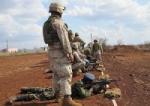Key Judgments
A. We judge with high confidence that in fall 2003, Tehran halted its nuclear weapons program; we also assess with moderate-to-high confidence that Tehran at a minimum is keeping open the option to develop nuclear weapons. We judge with high confidence that the halt, and Tehran’s announcement of its decision to suspend its declared uranium enrichment program and sign an Additional Protocol to its Nuclear Non-Proliferation Treaty Safeguards Agreement, was directed primarily in response to increasing international scrutiny and pressure resulting from exposure of Iran’s previously undeclared nuclear work.
• We assess with high confidence that until fall 2003, Iranian military entities were working under government direction to develop nuclear weapons.
• We judge with high confidence that the halt lasted at least several years. (Because of intelligence gaps discussed elsewhere in this Estimate, however, DOE and the NIC assess with only moderate confidence that the halt to those activities represents a halt to Iran's entire nuclear weapons program.)
• We assess with moderate confidence Tehran had not restarted its nuclear weapons program as of mid-2007, but we do not know whether it currently intends to develop nuclear weapons.
• We continue to assess with moderate-to-high confidence that Iran does not currently have a nuclear weapon.
• Tehran’s decision to halt its nuclear weapons program suggests it is less determined to develop nuclear weapons than we have been judging since 2005. Our assessment that the program probably was halted primarily in response to international pressure suggests Iran may be more vulnerable to influence on the issue than we judged previously.
B. We continue to assess with low confidence that Iran probably has imported at least some weapons-usable fissile material, but still judge with moderate-to-high confidence it has not obtained enough for a nuclear weapon. We cannot rule out that Iran has acquired from abroad—or will acquire in the future—a nuclear weapon or enough fissile material for a weapon. Barring such acquisitions, if Iran wants to have nuclear weapons it would need to produce sufficient amounts of fissile material indigenously—which we judge with high confidence it has not yet done.
C. We assess centrifuge enrichment is how Iran probably could first produce enough fissile material for a weapon, if it decides to do so. Iran resumed its declared centrifuge enrichment activities in January 2006, despite the continued halt in the nuclear weapons program. Iran made significant progress in 2007 installing centrifuges at Natanz, but we judge with moderate confidence it still faces significant technical problems operating them.
• We judge with moderate confidence that the earliest possible date Iran would be technically capable of producing enough HEU for a weapon is late 2009, but that this is very unlikely.
• We judge with moderate confidence Iran probably would be technically capable of producing enough HEU for a weapon sometime during the 2010-2015 time frame. (INR judges Iran is unlikely to achieve this capability before 2013 because of foreseeable technical and programmatic problems.) All agencies recognize the possibility that this capability may not be attained until after 2015.
D. Iranian entities are continuing to develop a range of technical capabilities that could be applied to producing nuclear weapons, if a decision is made to do so. For example, Iran’s civilian uranium enrichment program is continuing. We also assess with high confidence that since fall 2003, Iran has been conducting research and development projects with commercial and conventional military applications—some of which would also be of limited use for nuclear weapons.
E. We do not have sufficient intelligence to judge confidently whether Tehran is willing to maintain the halt of its nuclear weapons program indefinitely while it weighs its options, or whether it will or already has set specific deadlines or criteria that will prompt it to restart the program.
• Our assessment that Iran halted the program in 2003 primarily in response to international pressure indicates Tehran’s decisions are guided by a cost-benefit approach rather than a rush to a weapon irrespective of the political, economic, and military costs. This, in turn, suggests that some combination of threats of intensified international scrutiny and pressures, along with opportunities for Iran to achieve its security, prestige, and goals for regional influence in other ways, might—if perceived by Iran’s leaders as credible—prompt Tehran to extend the current halt to its nuclear weapons program. It is difficult to specify what such a combination might be.
• We assess with moderate confidence that convincing the Iranian leadership to forgo the eventual development of nuclear weapons will be difficult given the linkage many within the leadership probably see between nuclear weapons development and Iran’s key national security and foreign policy objectives, and given Iran’s considerable effort from at least the late 1980s to 2003 to develop such weapons. In our judgment, only an Iranian political decision to abandon a nuclear weapons objective would plausibly keep Iran from eventually producing nuclear weapons—and such a decision is inherently reversible.
F. We assess with moderate confidence that Iran probably would use covert facilities—rather than its declared nuclear sites—for the production of highly enriched uranium for a weapon. A growing amount of intelligence indicates Iran was engaged in covert uranium conversion and uranium enrichment activity, but we judge that these efforts probably were halted in response to the fall 2003 halt, and that these efforts probably had not been restarted through at least mid-2007.
G. We judge with high confidence that Iran will not be technically capable of producing and reprocessing enough plutonium for a weapon before about 2015.
H. We assess with high confidence that Iran has the scientific, technical and industrial capacity eventually to produce nuclear weapons if it decides to do so.















Bookmarks